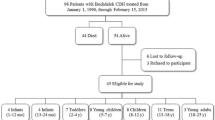Abstract
Mortality from surgical repair of tetralogy of Fallot (TOF) has decreased dramatically over the last several decades. Despite excellent surgical outcomes, studies reveal that patients with TOF continue to have decreased physical functioning, academic difficulties, and psychosocial impairments. We hypothesized that administering a validated quality-of-life assessment to patients with TOF during routine cardiology follow-up visits would help identify deficits and increase referrals to appropriate interventional programs. Between May 2017 and November 2018, TOF patients (5–20 years) and/or their families completed a standardized quality-of-life assessment (PedsQL 4.0) during cardiology clinic visits. Providers were encouraged to refer patients with abnormal PedsQL 4.0 scores to appropriate services including cardiovascular rehabilitation, psychological evaluation, neurodevelopmental testing, and school intervention. Referrals for the intervention group were compared to those of a control group using χ2 analysis. The PedsQL 4.0 was completed by 79 patients at 90 clinic visits. At least one abnormal PedsQL 4.0 score was identified in 58% (52/90) of patient encounters, and of those 52 encounters, 38% (20/52) received at least one referral for intervention. The most commonly placed referrals were for neurodevelopmental testing (16) and school intervention (11). When comparing the number of referrals from the intervention group to those of the control group, referrals to all intervention services were statistically significant (p < 0.05). Our quality improvement initiative successfully utilized a quality-of-life assessment to detect deficits and subsequently increased the number of referrals to intervention services. Future studies will address barriers that prevent completion of the PedsQL and assess how interventions impact quality-of-life scores.




Similar content being viewed by others
References
Murphy JG, Gersh BJ, Mair DD et al (1993) Long-term outcome in patients undergoing surgical repair of tetralogy of Fallot. N Engl J Med 329:593–599
Smith CA, McCracken C, Thomas AS et al (2019) Long term outcomes of tetralogy of Fallot: a study from the pediatric cardiac care consortium. JAMA Cardiol 4:34–41
Nollert G, Fischlein T, Bouterwek S et al (1997) Long-term survival in patients with repair of tetralogy of Fallot: 36-year follow-up of 490 survivors of the first year after surgical repair. J Am Coll Cardiol 30:1374–1383
Hickey EJ, Veldtman G, Bradley TJ et al (2012) Functional health status in adult survivors of operative repair of tetralogy of Fallot. Am J Cardiol 109:873–880
Knowles R, Veldtman G, Hickey EJ et al (2012) Functional health status of adults with tetralogy of Fallot: matched comparison with healthy siblings. Ann Thorac Surg 94:124–132
Daliento L, Mapelli D, Russo G et al (2005) Health related quality of life in adults with repaired tetralogy of Fallot: psychosocial and cognitive outcomes. Heart 91:213–218
van Rijen EHM, Utens EMWJ, Roos-Hesselink JW et al (2005) Current subjective state of health, and longitudinal psychological well-being over a period of 10 years, in a cohort of adults with congenital cardiac disease. Cardiol Young 15:168–175
Bellinger DC, Rivkin MJ, DeMaso D et al (2015) Adolescents with tetralogy of Fallot: neuropsychological assessment and structural brain imaging. Cardiol Young 25:338–347
Opic P, Utens E, Ruys T, Domburg R (2014) Long term psychosocial outcome of adults with tetralogy of Fallot and transposition of the great arteries: a historical comparison. Cardiol Young 24:593–604
Marino BS, Lipkin PH, Newburger JW et al (2012) Neurodevelopmental outcomes in children with congenital heart disease: evaluation and management. Circulation 126:1143–1172
Varni JW, Burwinkle TM, Seid M et al (2003) The PedsQL 4.0 as a pediatric population health measure: feasibility, reliability, and validity. Ambul Pediatr 3:329–341
Varni JW, Seid M, Knight TS, Uzark K, Szer IS (2002) The PedsQL 4.0 generic core scales: sensitivity, responsiveness, and impact on clinical decision-making. J Behav Med 25:175–193
Uzark K, King E, Spicer R, Beekman R, Kimball T, Varni JW (2013) The clinical utility of health-related quality of life assessment in pediatric cardiology outpatient practice. Congenit Heart Dis 8:211–218
Acknowledgements
The authors would like to recognize Mary Krolikowski, clinical resource nurse at the Herma Heart Institute, for her contributions to this project.
Author information
Authors and Affiliations
Corresponding author
Ethics declarations
Conflict of interest
The authors have no confict of interest to disclose.
Ethical Approval
All procedures performed in studies involving human participants were in accordance with the ethical standards of the institution and/or national research committee and with the 1964 Helsinki Declaration and its later amendments or comparable ethical standards.
Additional information
Publisher's Note
Springer Nature remains neutral with regard to jurisdictional claims in published maps and institutional affiliations.
Rights and permissions
About this article
Cite this article
Siebrasse, A., Allen, S., Lavoie, J. et al. Implementation of Quality-of-Life Assessment Increases Referrals for Intervention in Patients with Tetralogy of Fallot. Pediatr Cardiol 40, 1569–1574 (2019). https://doi.org/10.1007/s00246-019-02188-y
Received:
Accepted:
Published:
Issue Date:
DOI: https://doi.org/10.1007/s00246-019-02188-y




